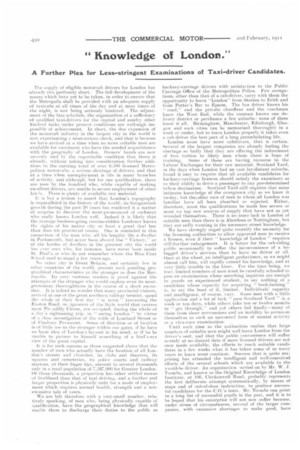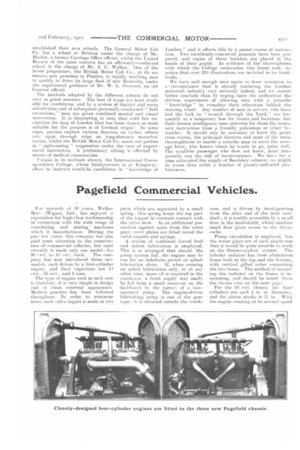" Knowledge of London. I 9
Page 14

Page 15

If you've noticed an error in this article please click here to report it so we can fix it.
A Further Plea for Less-stringent Examinations of Taxi-driver Candidates.
The supply of eligible motorcab drivers for London has :already lain perilously short. The full development of the meahis. which have yet to be taken, in order to ensure that the Metropolis shall be provided with an adequate supply .of taxicabs at all times of the day and at most times of The night, is now being seriously hindered. The adjustment of the fare schedule, the organization of a sufficiency of qualified taxi-drivers for the capital and sundry other kindred tasks under present conditions are well-nigh im,possilde of achievement, In short, the due expansion nt the motorcab industry in the largest city in the world is now experiencing a most-serious check, and that is because we have arrived at a time when no more suitable men are :available for enrolment who have the needed acquaintance with the geography of L1Md on. thvners hands are now severely tied by the regrettable condition that there is already. without taking into consideration furthev additions to the existing total of over 6,500 licensed Metropolitan mntorcabs. a serious shortage of drivers, and that at a time when unemployment is rife in many brandies of activity, and although, but for one qualification, there are men by the hundred who, while capable of making excellent drivers, are unable to secure employment of other kinds. There is plenty of available raw material.
I t is but a truism to assert that London's topogtaphy is unparalleled in the history of the a odd ; its Gargantuan growth during the past 20 years has rendered it a matter of surprise to discover the most-pronounced of cockneys wino really knows London well. Indeed it is likely that the average business-going routine-ridden Londoner knows the sights of his native city at least a great deal Is than does ids provincial cousin. One is reminded in this connueetion of the man wi o. all his lengthy life a dweller in Portsemeth. had never !leen aboard the " Victory," or of the hordes of dwellers in tine greatest city the world has ever seen who, for instance, have never been inside 'St. Paul's or who do not remember where the Blue Coat Scheol used to stand a teat years ago.
No other city in Great Britain, und certainly few in other countries of the world. present such puzzling geographical dmracteristics to the stranger as does the Metropolis. Its very vastness renders it proof against the attempts of the strauger who a mild explore even its mostprominent thoroughfares in the course of a short excursion. It is indeed no wonder that many provincial visitors, arrived at one of the great northern railway termini. spend the whole of their first day " in town " traversing the Einstein Road. or, ignorant. of the little world that centres upon Pic:odilly Circus, are occupied. during the whole of It cley's sig,htseeing trip, in " seeing London " hy virtue of a close investigation et the wilds of Lombard Street or
Vinsliery Pavement. Sense of direction or of heotion is of little use to the stranger within our gates, if he have no iii a' idea of London's lay-out in his mind, or if he be unable to picture to himself something of a bird's-eye view of the great capital.
It is for such reasons as those suggested above that the number of men who actually have the location of all London's streets and dierelnes, its clubs and theatres, its squares and eemeteries, its police courts and railway .statiens, at their finger tips. amount to several thousiduls only in a total population of 7,537,000 for Greaten. London. 'Of those 'thousands. a proportion Inns other settled means of livelihood than that of taxi driving, and a further and larger proportion is physically unfit for a motle of employment which requires normal health, strength :Ind n netexcessive tale of years.
We are left therefore with a very-small number. relatively speaking, of men who, being physically capable of qualificatioe, have the geographical knowledge that will enable them to discharge their duties to the public as hackney-carriage drivers with satisfaction to the Public Carriage Office of the Metropolitan Police. Few occupations, other than that of a cab-driver, carry with them the opportunity to learn "London" from Staines to Erith and from Potter's Bar to Epsom. The bus driver knows his " road," and the private chauffeur and the coachman know the West End, while the vanman knows one delivery district or perchance a few suburbs: none of them know it all. Birmingham, Manchester, Edinburgh, Glasgow and such cities can be memorized thoroughly in a week or under, but to learn London properly it takes even eab driver the best part of a long perambulating life.
London must have more cabdrivers, that is certain. Several of the largest companies are already feeling the shortage so badly that they are offering the inducement of free tuition to likely men whom there is hope of training. Some of these are having recourse to the Labour Exchanges for their raw material. Scotland Yard, in the days when IAmdon had no vast far-distant suburbs, found it easy to require that all available candidates for haekney-carriage licences should satisfy the examiners as to their ability to drive a passenger to any pre-determined 'urban destination. Scotland Yard still requires that same intimate knowledge of the overgrown city as we know it to-day, but the.older race of men to whom all London was familiar have all been absorbed or rejected. Either, therefore, must the qualifications be made less severe or must we tap new sources of supply that have not as yet revealed themselves. There is no more lack in London of suitable men than there is in Aberdeen or Nottingham, hut they are sadly wanting in the necessary street knowledge. We have strongly urged quite recently the necessity for the licensing authorities to allow approved men to receive a licence, even if their " knowledge of London " requires still-further enlargement. It is better for the cab-riding pnblic occasionally to suffer the inconvenience of a befogged driver's services than to have no driver at all. Once at the wheel, an intelligent probationer, as we might almost call him, will rapidly extend his knowledge, and at very little trouble to the hirer. For the time being, we fear, limited numbers of men must be carefully schooled to pass an examination whose searching inquiries are enough to puzzle an experienced student, to say nothing of a candidate whose capacity for acquiring " hook-laming " is, to say the least of it, limited. Individuals' capacity and intelligence, of coorse, vary. Some men with a little application and a lot of luck " pass Scotland Yard " iii a week or ten days, while others take ten or twelve months to " get through," and yet others fail finally—many of them from sheer nervousness and an inability to accustnnm themselves to such an unwonted form of mental activity as a viva-voce examination.
Until such time as the authorities realize that large numbers of suitable men might well learn London from the driver's seat, and that the public convenience will suffer acutely at ito distant date if more licensed drivers are not soon made available, the efforts to teach suitable candidates in a few weeks what it has taken some of us many Years to learn must continue. Success that is quite surprising has attended the intelligent and well-conceived efforts of the several schools which are available to the would-be driver. Ain organization _mrried on by Mr. W. J. Toombs, and known es the Original Knowledge of London institute, at 166, Clerkenwell Road, probably represents the first deliberate attempt systematically, by means of maps and of out-of-door instruction, to produce successful cmndidates for the C.O.'s tests. Mr. Toombs can point to a long list of suecessful pupils in the past, and it is to be hoped that his enterprise will not now suffer because, under stress of circumstances, several of the larger companies, with extensive shortages to make good, have established their own schools. The General Motor Cab Co. has a school at Brixton under the charge of Mr. Bladen, a former Carriage Office official, whilst the United Branch of the same concern has an efficiently-conducted school in the charge of Mr. J. C. Walker. One of the latest proprietors, the British Motor Cab Co., at its extensive new premises in Pimlico, is rapidly teaching men to qualify to drive its large fleet of new Renaults, under the experienced guidance of Mr. W. L. ()remold, an old General official.
The methods adopted by the different schools do not vary in great measure. The best of maps are kept available for candidates, and by a system of district and mite sub-division and of subsequent personally-conducted " field excursions," men are given combined mental and visual instruction. It is disquieting to note that with few exceptions the map of London that has been chosen as most suitable for the purpose is of German origin! In some eases, parties explore various districts on cycles, others rely upon through trips an long-distance matorbns routes, whilst the British Motor Cab Co. sends out parties in " sight-seeing " wagonettes under the mre of experienced instructors. A preliminary sifting is effected by means of medical examination.
Unique in its methods always, the International Correspondence College, whose headquarters is at Kingsway, offers to instruct would-be candidates in " knowledge of London," and it effects this by a postal course of instruction. Two excellently-conceived manuals have been prepared, and copies of these booklets are placed in the hands of their pupils. As evidence of the thoroughness _ with which the College undertakes this latesttask, we • notice that over 220 illustrations arc included in its hand-. books.
We have said enough once again to draw attention to circumstance that is already hindering the Londoo motorcab industry very seriously indeed, and We cannot. better conclude than by urging upon the authorities the obvious experiment of allowing men with a passable " knowledge" to complete their education behind the steering wheel. Any number of men in service, who have • had the hick to " scratch through the Yard," are frequently at a temporary lass for routes and locations, but their inborn intelligence soon procures for them the necessary instruction from a friendly policeman or other bystander. It should only be necessary to know the great.. cross route.s, the principal districts and most of the main thoroughfares to enable a suitable man to serve the average hirer, who knows where he wants to go, quite well_ The would-be passenger who does not know, must temporarily run the risk of inconvenience. We have for a time exhausted the supply of Baedeker cabmen; we might: do worse than enlist a number plainly-indicated prohationers.






















